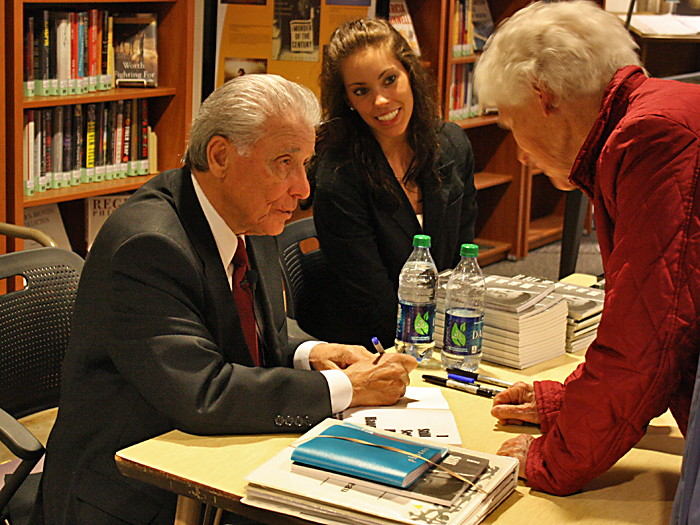- Aaron Elster,
Holocaust survivor
 |
Holocaust survivor Aaron Elster signs a copy of his book after his presentation at Milner Library. (Photo by George Jett / Staff Photographer) |
“I was born a Jew, I am a Jew, I am Jewish and I believe in God although all that has happened to me” said Aaron Elster.
Child survivor of the Holocaust and author, Aaron Elster was welcomed to Illinois State Universities campus Wednesday night for a presentation and book signing. In his book, I Still See Her Haunting Eyes, the stories of his time as a child while hiding from the German soldiers, not only touched community members but students of ISU as well.
Through the kindness of a Polish family friend, Elster was able to survive the Holocaust genocide and be able to spread his own story and those of others during a time of complete tragedy.
When asked how Elster survived, his response was that he “either had the choice to give into misery or fight it” he continued to say “if you can hold onto your mind, you can overcome it.”
During the Holocaust genocide, over 11 million people were killed. Six million of these people were Jews and one and a half million were children. Elster’s six-year-old sister being one of them.
Elster was six years old when Germany invaded Poland. The “sub-human” Jews were taken from their homes, all possessions confiscated, and thrown into the ghetto. There were over 1,000 people living within the tight quarters of the ghetto. Not only were living conditions poor but there was no medical services and each individual was fed less than five hundred grams of food each day.
German soldiers came through the ghetto and villages of Poland to murder the Jews or send them to a concentration camp. Elster explained how it was an everyday occurrence to see dead bodies lied up the side of buildings and people digging their own graves before they got shot.
“It was total reality, it’s what happened, we were not human beings, they were cleansing the world of us non-humans,” Elster said.
Elster and his mother, father and little sister found a hiding spot in an attack of a Polish friend. Here they tried to keep quiet so the Gestapo would not hear them. One by one, the footsteps of the German soldiers came closer and closer to the entrance. Before Elster could blink, blood was all over the attic from gun shots and he and his family were being pulled out of the attic by the police.
“The genocide was Germany solution to the Jewish problem,” Elster says.
As the soldiers lined up the family in the market place square, where blood from other murdered Jews lined the cobble stone, Elster’s father whispered to him, “run”.
Elster did as he was told. Luckily, the guards did not spot Elster, the little boy, as he crawled as close to the ground as he could.
“All I could think of was how can all these horrors be possible, the sun is shining, where is God?” Elster continued, “I blocked out all messages of fear but all I could think was how could I have left my family?”
For what seemed like a countless number of nights, Elster went from barn to barn looking for a place to hide or get food. Many people did not want to help out a Jew because there was too much of a risk for them to be killed themselves.
Elster eventually made his to a Polish family friend, where his older sister was being kept in hiding as well. For two years, Elster was in hiding before Poland was liberated. For this time, he slept in the attic on a dirt floor with a tin roof.
During this time Elster explained how “hunger became [his] only preoccupation and that loneliness was [his] only constant companion.”
At the end of two long years in hiding, Poland was liberated by the Russian army. Before the Holocaust there were 6,000 people living in Elster’s town, after the Holocaust, 29 people were still alive with only two children survivors, Elster and his older sister Irene.
Elster came to find out that his father was killed in the gas tanks of Treblinka death camp. His mother was killed by the Gestapo after being turned in by a farmer. His younger sister also died during the Holocaust.
When asked if had ever returned home to his town in Poland, Elser’s responded, “There is no going home, this blessed place is my home, Poland is just another country to me now, and the U.S.A. is my life.”